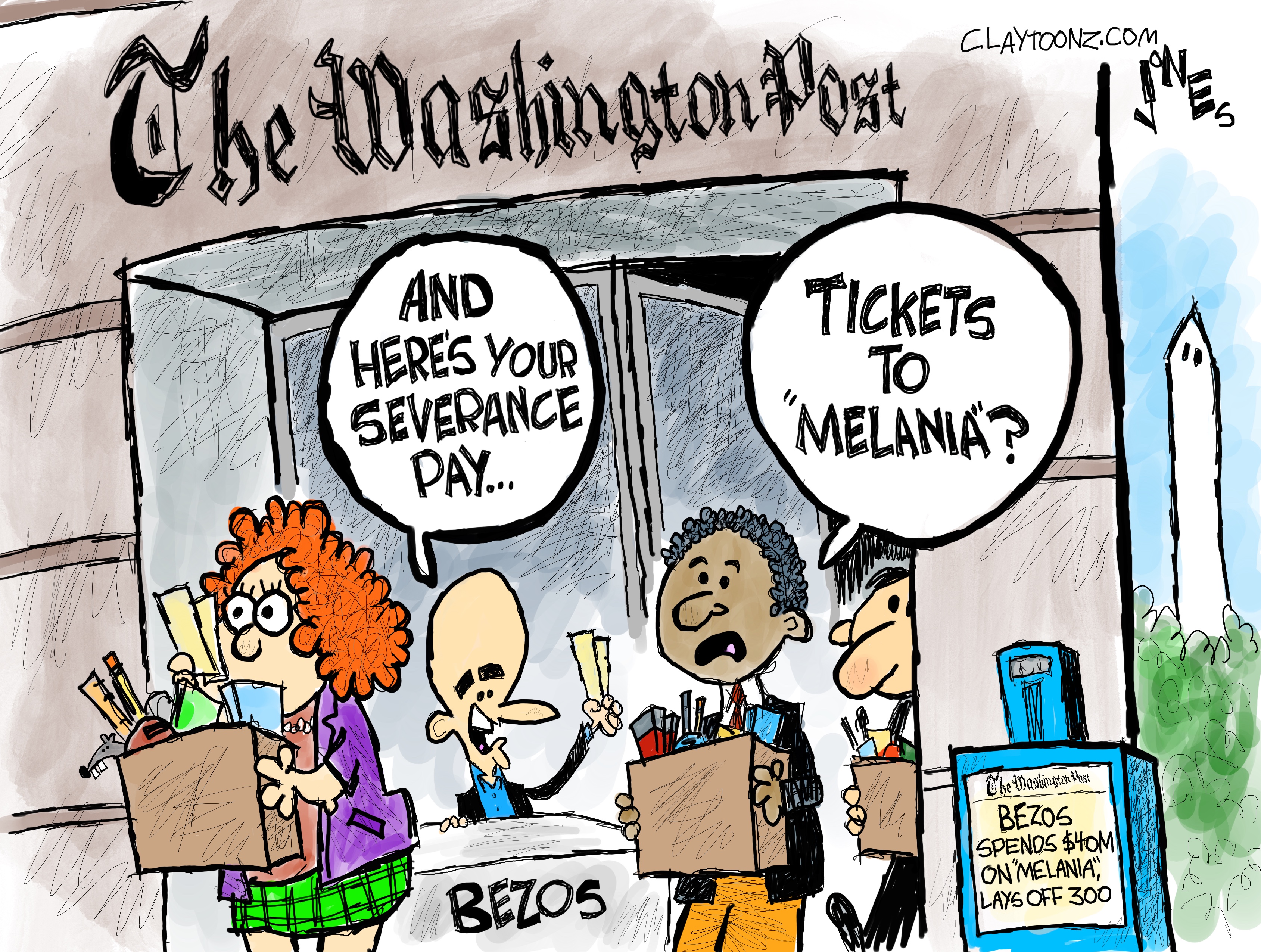Why would Matt Gaetz resign?
How politicians learned to overcome decency and power through their sex scandals


A free daily email with the biggest news stories of the day – and the best features from TheWeek.com
You are now subscribed
Your newsletter sign-up was successful
Rep. Matt Gaetz (R-Fla.) may be in trouble, but he isn't running away. The Florida Republican is reportedly under investigation for transporting a 17-year-old girl across state lines to have sex. That news led to allegations he has shown nude photos of his purported sex partners to colleagues on the floor of the House of Representatives — behavior that may not be illegal but (if true) is certainly dishonorable, gross, and wrong. Predictably, there have been calls for Gaetz to resign. Just as predictably, he has dismissed those demands.
Why would he quit?
The last few years have taught us that public officials in America can power through just about any revelations of impropriety simply by refusing to go away — and that it is even possible to reach new heights of power after enduring a season of humiliation. Donald Trump became president after he was caught on video bragging about sexual assault and stayed in office for four years despite allegations from a number of women. Bill Clinton survived impeachment after getting caught lying about his affair in the Oval Office and left office with extraordinarily high approval ratings. Similarly, New York Gov. Andrew Cuomo (D) is betting that he can similarly survive mounting allegations of sexual harassment. He may not be wrong.
The Week
Escape your echo chamber. Get the facts behind the news, plus analysis from multiple perspectives.

Sign up for The Week's Free Newsletters
From our morning news briefing to a weekly Good News Newsletter, get the best of The Week delivered directly to your inbox.
From our morning news briefing to a weekly Good News Newsletter, get the best of The Week delivered directly to your inbox.
Sex scandals have been part and parcel of America's political culture, going all the way back to the Founders. Usually, getting caught meant the end of one's political career. Alexander Hamilton's days in service came to a close when his affair with Maria Reynolds became public. Similarly, Gary Hart's presidential ambitions foundered in 1987 when Donna Rice sat on his lap aboard the aptly named Monkey Business. New York Rep. Andrew Weiner resigned his seat after a suggestive photo he sent via Twitter became news; Weiner later attempted to run for New York mayor, only to be taken down by new revelations that landed him in prison.
There have been exceptions, of course. Grover Cleveland won the presidency in 1884 even though he had fathered a child out of wedlock. And before he was elected to the White House in 1992, Clinton went on 60 Minutes to vaguely admit to "causing pain in my marriage." More often, though, high-profile politicians gained and held onto power by keeping their peccadilloes out of the papers until after their careers were over.
Expectations have obviously changed.
We're nearly a half-century removed from the heady days of the Sexual Revolution — Americans no longer place many taboos on their own behavior or that of their neighbors, so they no longer have much expectation that their leaders will abide by strict codes of personal sexual conduct. Indeed, former Vice President Mike Pence was widely mocked and criticized for refusing to ever be alone in a room with women who weren't his wife. It is more difficult to have a sex scandal when consensual sex itself is no longer treated as a scandal. Hypocrisy isn't even that big a deal anymore. The scandals that remain generally involve abuse of power, funny accounting, the age of consent, or some other violation of federal or state law.
A free daily email with the biggest news stories of the day – and the best features from TheWeek.com
Polarization has accelerated this shift. When Clinton's Oval Office affair with Monica Lewinsky came to light in 1998, a number of newspapers called for him to resign from office, but Democrats mostly circled the wagons. (There were some notable exceptions.) They believed, not unreasonably, that Republicans had spent years searching for any scandal they could drum up to force Clinton's early retirement. More recently, Sen. Al Franken (D-Minn.) resigned in the wake of sexual harassment allegations — but a number of Democrats now regret his departure, and the faltering performance of Sen. Kirsten Gillibrand (D-N.Y.) during the 2020 presidential primaries was due in part to her now-unpopular role in pressuring Franken to leave office. Gillibrand, notably, was slow to call for Cuomo's resignation during his recent travails.
This isn't just a Democratic trend, though. When the Access Hollywood tape emerged in 2016, some Republicans openly criticized Trump, then found themselves on the outs when he won the presidency anyway. Trump, of course, went on to endorse Roy Moore in Alabama's 2017 Senate race. Moore just barely lost that election, despite allegations he had behaved improperly with teen girls. These days, party matters more than propriety.
Something has been lost in this whole process. The notion that virtue or decency matters in public life or personal conduct has been largely displaced by “Flight 93 Election” thinking that ignores those qualities as luxuries to be abandoned in a political war against one's political rivals. A politician who missteps can always blame “cancel culture” or shadowy conspiracies for their misfortune. Short of a criminal conviction, only shame would ever compel an official to give up their power. There is precious little of that left in politics. There is no use for it. Which is why there is little reason to expect that Matt Gaetz or Andrew Cuomo will resign anytime soon — not, at least, until something better comes along.
Joel Mathis is a writer with 30 years of newspaper and online journalism experience. His work also regularly appears in National Geographic and The Kansas City Star. His awards include best online commentary at the Online News Association and (twice) at the City and Regional Magazine Association.
-
 Nan Goldin: The Ballad of Sexual Dependency – an ‘engrossing’ exhibition
Nan Goldin: The Ballad of Sexual Dependency – an ‘engrossing’ exhibitionThe Week Recommends All 126 images from the American photographer’s ‘influential’ photobook have come to the UK for the first time
-
 American Psycho: a ‘hypnotic’ adaptation of the Bret Easton Ellis classic
American Psycho: a ‘hypnotic’ adaptation of the Bret Easton Ellis classicThe Week Recommends Rupert Goold’s musical has ‘demonic razzle dazzle’ in spades
-
 Political cartoons for February 6
Political cartoons for February 6Cartoons Friday’s political cartoons include Washington Post layoffs, no surprises, and more
-
 The billionaires’ wealth tax: a catastrophe for California?
The billionaires’ wealth tax: a catastrophe for California?Talking Point Peter Thiel and Larry Page preparing to change state residency
-
 Bari Weiss’ ‘60 Minutes’ scandal is about more than one report
Bari Weiss’ ‘60 Minutes’ scandal is about more than one reportIN THE SPOTLIGHT By blocking an approved segment on a controversial prison holding US deportees in El Salvador, the editor-in-chief of CBS News has become the main story
-
 Has Zohran Mamdani shown the Democrats how to win again?
Has Zohran Mamdani shown the Democrats how to win again?Today’s Big Question New York City mayoral election touted as victory for left-wing populists but moderate centrist wins elsewhere present more complex path for Democratic Party
-
 Millions turn out for anti-Trump ‘No Kings’ rallies
Millions turn out for anti-Trump ‘No Kings’ ralliesSpeed Read An estimated 7 million people participated, 2 million more than at the first ‘No Kings’ protest in June
-
 Ghislaine Maxwell: angling for a Trump pardon
Ghislaine Maxwell: angling for a Trump pardonTalking Point Convicted sex trafficker's testimony could shed new light on president's links to Jeffrey Epstein
-
 The last words and final moments of 40 presidents
The last words and final moments of 40 presidentsThe Explainer Some are eloquent quotes worthy of the holders of the highest office in the nation, and others... aren't
-
 The JFK files: the truth at last?
The JFK files: the truth at last?In The Spotlight More than 64,000 previously classified documents relating the 1963 assassination of John F. Kennedy have been released by the Trump administration
-
 'Seriously, not literally': how should the world take Donald Trump?
'Seriously, not literally': how should the world take Donald Trump?Today's big question White House rhetoric and reality look likely to become increasingly blurred
